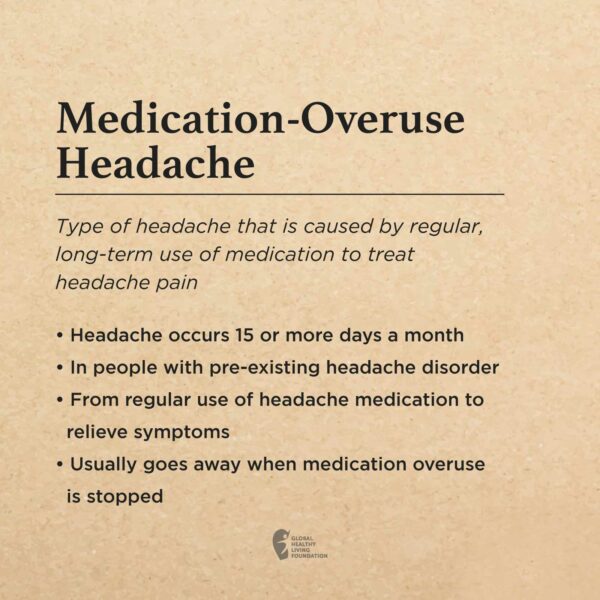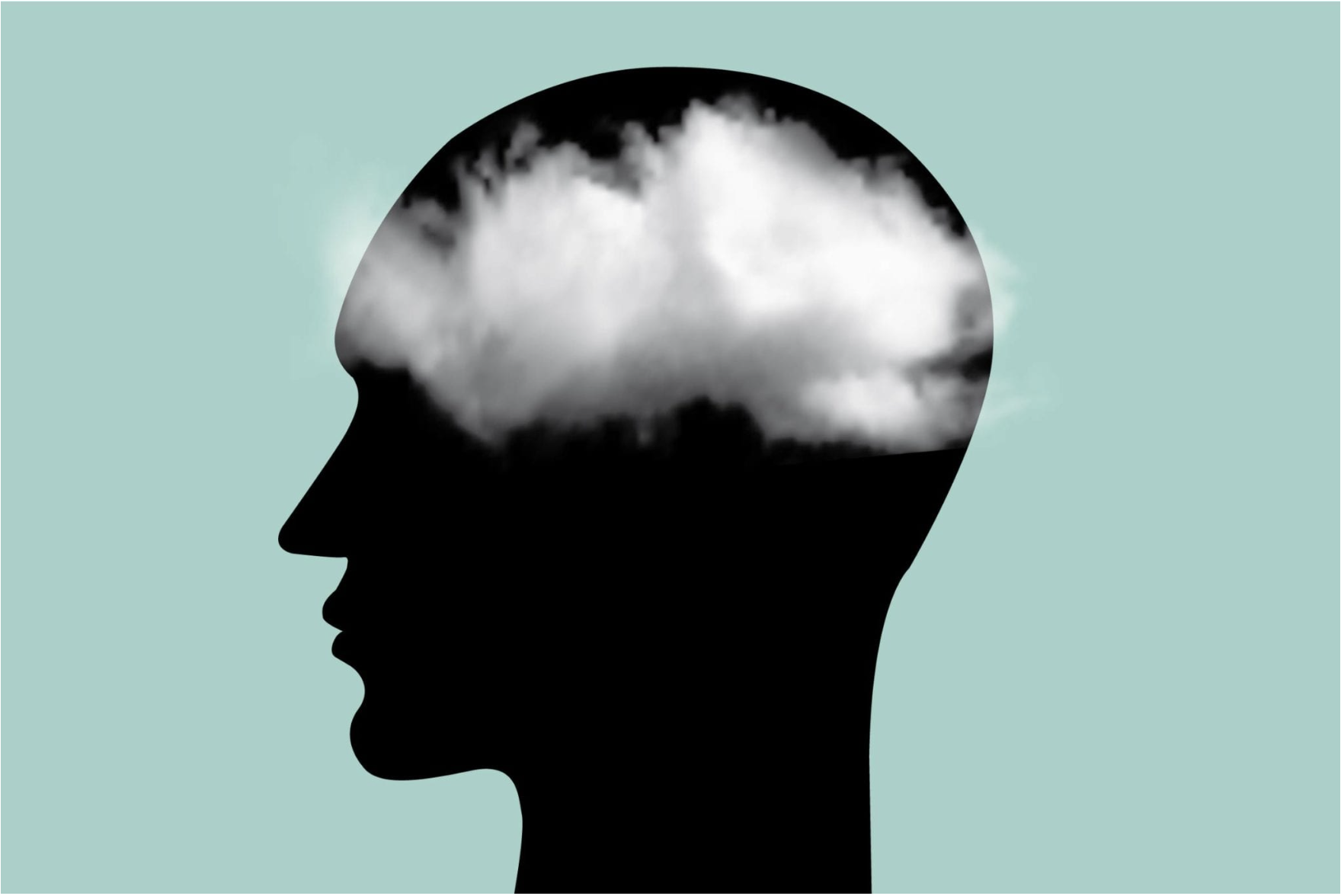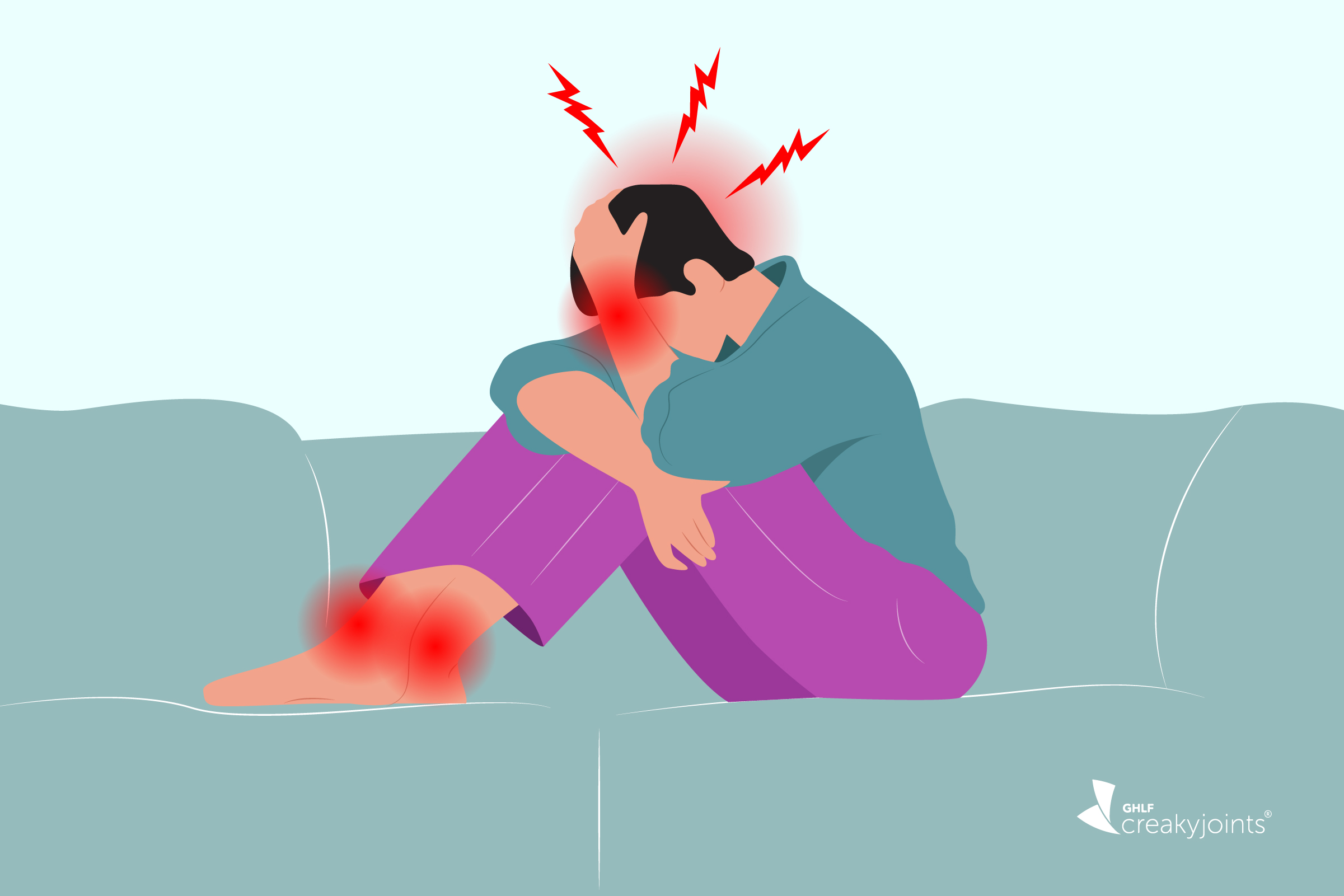The Up-End Migraine Project reveals key gaps in episodic migraine care, aiming to drive change and improve treatment options for patients through insights from both providers and patients.
Medication-Overuse Headache: New Thinking on How to Understand and Prevent It
MEDICATION-OVERUSE HEADACHE: NEW THINKING ON HOW TO UNDERSTAND AND PREVENT IT
July 14, 2021
Anne M. Sydor

File this under the it’s-not-fair folder of chronic disease management challenges: Sometimes the very medications you take to relieve headache pain can actually cause more headaches if you take them too often.
This condition is sometimes referred to as rebound headache or medication adaptation headache, but the technical medical term for is medication-overuse headache (MOH). (We use medication-overuse headache in this resource because that is the language used by International Classification of Headache Disorders.)
If you regularly take medication to treat headache symptoms, it’s important to understand what a medication-overuse headache is, what causes it, and how you can prevent or stop it.
What Is Medication-Overuse Headache?
The International Classification of Headache Disorders, 3rd edition defines medication-overuse headache (MOH) as:
“Headache occurring on 15 or more days/month in a patient with a pre-existing primary headache and developing as a consequence of regular overuse of acute or symptomatic headache medication (on 10 or more or 15 or more days/month, depending on the medication) for more than 3 months. It usually, but not invariably, resolves after the overuse is stopped.”
Breaking down that definition into everyday language can provide a few rules of thumb to more easily understand medication-overuse headache.
Understanding the phrase: “15 or more days per month”
This could be a headache every day for just over two weeks or a headache every other day for a month — it varies from person to person.
Rule of thumb: MOH is likely when days without headache are the exception, not the rule.
Understanding the phrase: “a pre-existing primary headache”
This means having regular headaches that are not symptoms of another problem. This includes migraine attacks, tension-type headaches, cluster headaches, and more. Most importantly, you can have a primary headache disorder and realize it.
Rule of thumb: MOH is not just about using medicine — the underlying root cause is having frequent headaches severe enough to need treatment regularly.
Understanding the phrase: “regular overuse of acute or symptomatic headache medication. . .”
There are many different medications used to treat headache and migraine pain with many different definitions of how much is appropriate to use.
Rule of thumb: If you regularly take any medicine for headache more than three times in an average week, it is a good idea to talk to with a health care professional about improving your treatment.
Understanding the phrase: “usually, but not invariably, resolves. . .”
This is the good news. Most medication-overuse headache goes away with changes in how headache medications are used. The bad news is that it can be very hard to stop a medicine you’ve become used to taking.
Rule of thumb: Preventing MOH is easier than treating MOH.
Signs You Could Have Medication-Overuse Headache
How do you know if the headache you have is a “regular” headache or one that’s due to medication overuse? “While there is some overlap, there are clues that it’s MOH vs. a primary headache,” says neurologist Peter McAllister, MD, Cofounder and Medical Director, New England Institute for Neurology and Headache. Dr. McAllister recently addressed the issue of medication-overuse headache on a recent episode of our podcast Talking Head Pain.
1. You wake up with headache
Having head pain from the moment you wake up is a clue that you could be experiencing MOH. (It indicates you could be in withdrawal from the offending medication.)
2. You feel relief from taking the medication causing MOH
Medication-overuse headache tends to improve when you treat it with the offending medication but then returns as the drug’s effects wear off.
3. The headache pain is more bland than severe
“The headache of MOH is more bland and mild-to-moderate, versus with a migraine, it’s throbbing and there are other associated symptoms like nausea and lite sensitivity, says Dr. McAllister.
What Causes Medication-Overuse Headache?
According to the Mayo Clinic, any medication you take for pain relief can cause medication-overuse headaches in people who have headache disorders. This includes prescription and over-the-counter medications. Taking pain medication for another condition, such as arthritis, hasn’t been shown to cause MOH in those who do not already have headache pain.
Medication-overuse headache is considered common — and should be suspected in anyone who has chronic headache symptoms, according to a paper published in the journal Pain Reports. The paper says that any “immediate-relief medication” has the potential to cause MOH.
Examples of headache medications that can trigger medication-overuse headaches include:
- Over-the-counter pain relievers, such as ibuprofen (ex: Advil) or acetaminophen (ex: Tylenol)
- Combination over-the-counter pain relievers, such as Excedrin (combines caffeine, aspirin, and acetaminophen)
- Prescription migraine medications, such as triptans (ex: Imitrex) and ergots (ex: Ergomar)
- Opioid medications, such as those that include codeine
Preventive Headache Medication Does Not Cause Medication-Overuse Headache
When we talk about medication for headache pain relief, we mean taking medication to treat headache pain that you presently have — not medication taken to prevent headache pain in the first place. Medication taken regularly to prevent headache pain as part of your headache or migraine treatment plan does not cause medication-overuse headaches.
Preventive medications in this category include:
- Blood pressure drugs (beta blockers, calcium channel blockers, angiotensin blockers)
- Antidepressants (SSRI antidepressants, tricyclic antidepressants)
- Anti-seizure medications (topiramate and sodium valproate)
- CGRP medications (calcitonin gene-related antibodies, which are newer medications developed specifically to prevent migraine)
To summarize, most medicines used to stop or reduce headache pain can cause more frequent headaches — if these are taken more often than three times per week or 10 times per month.
The exceptions to this are some of the newest medications that became available in 2020 and 2021: lasmiditan (Reyvow), ubrogepant (Ubrelvy), and rimegepant (Nurtec). Unfortunately, these newer medications can also be difficult to access for many because of insurance policies and out of pocket costs.
Preventing Medication-Overuse Headache
When it comes to treating MOH, “step one is education,” says Dr. McAllister. This means being aware of the phenomenon in the first place, what kinds of medications cause it, and the signs you likely have it.
“The biggest mistake is trying to treat one’s headache without consulting a neurologist or headache specialist,” he adds.
You can reduce or prevent medication-overuse headaches by keeping the following things in mind.
1. Do not stop medications cold turkey
It’s natural to wonder: Well, if a given medicine can cause a headache, shouldn’t we just stop using that medicine for headache?
The answer is no.
This thinking stems partly from misunderstanding and stigma about pain, including the ideas that it is heroic to push through pain or “tough it out” or that pain itself is a sign of weakness.
Current scientific knowledge about pain tells us the reality is much more complicated.
At root, pain is a protective biologic process. Nerves in the face, neck, and body signal the brain in response to injury. The spinal cord and brain signal back to withdraw and that the message was received. To make this more efficient, a third path signals between the paths going to and coming from the brain. When pain processes go wrong, as in headache disorders, that third path — the crosstalk between the signals going to and from the brain — can complicate matters. This can lead to such issues as sensitization and adaptation, which play a role in medication-overuse headaches.
Sensitization
In sensitization, the longer pain lasts, the stronger the signaling to the brain to “do something” becomes. Sensitization can be thought of as being more likely to sense pain.
Adaptation
In adaptation, the longer the pain lasts, the less effective the message of “all clear” becomes. Adaptation can be thought of as being less likely to respond to pain treatments.
The result is that untreated pain can increase pain. This is why stopping all headache treatments cold turkey is not a good idea — even when too much medicine is what caused increased headaches.
So, medicine to stop headaches can make them more frequent, but stopping the medicine can do the same thing? That may sound like a sick joke. What are people with frequent headaches supposed to do?
2. Effective headache treatment is the best prevention
As signals in the headache pain circuit continue, a person becomes more likely to have a headache (sensitization) and less likely to respond to treatment (adaptation).
With this understanding, the goal for treating or preventing medication-overuse headache are actually the same: reduce the number of headaches that need treatment, because frequent activation of the headache circuit is the underlying cause of MOH.
This is supported by recent research showing that starting preventive treatment while stopping overused medications is most effective for treating MOH. Even without medication-overuse headache, preventive treatment can be considered if you have moderate-to-severe headache on more than four days per month. Preventive treatment reduces headache days by at least half for more than half the people who use them, and there are several now that do not require taking medication daily, although again, these can be more difficult to access.
When a patient is suspected to have MOH, Dr. McAllister says, “we start a preventive med and ask that the patient taper off the offending med as the preventive kicks in. Sometimes bridge therapy, such as occipital nerve blocks or a short taper of oral steroids, is needed as well.”
Even with effective preventive treatment, headaches may still occur. Stopping the pain of these “breakthrough” headaches or migraine attacks as effectively as possible is also important in stopping the pain cycle.
Anyone using preventive treatment should also talk with their health care team about finding the most effective acute “rescue” treatment in case a headache or migraine attack does occur.
Listen to Our New Podcast Talking Head Pain
If you have pain because of migraine or other headache disorders, chances are you’ve felt alone, misunderstood, and frustrated about how to manage your symptoms and get others to grasp what you’re going through. Our new podcast shares the stories, challenges, and successes of other people living with migraine and headache so you can learn how they’re coping and get support. Learn more and listen here.
Alstadhaug KB, et al. Preventing and treating medication overuse headache. Pain Reports. July 26, 2017. doi: https://doi.org/10.1097/PR9.0000000000000612.
American Headache Society. The American Headache Society Position Statement on Integrating New Migraine Treatments Into Clinical Practice. Headache: The Journal of Head and Face Pain. December 10, 2018. doi: https://doi.org/10.1111/head.13456.
Ashina S. Stopping the vicious cycle of rebound headaches. Harvard Health Publishing. November 7, 2019. https://www.health.harvard.edu/blog/stopping-the-vicious-cycle-of-rebound-headaches-2019110718180.
Carlsen LN, et al. Comparison of 3 Treatment Strategies for Medication Overuse Headache A Randomized Clinical Trial. JAMA Neurology. May 26, 2020. doi: https://doi.org/10.1001/jamaneurol.2020.1179.
Headache Classification Committee of the International Headache Society (IHS) The International Classification of Headache Disorders, 3rd edition. Cephalalgia: An International Journal of Headache. January 2018. doi: https://doi.org/10.1177/0333102417738202.
Interview with Peter McAllister, MD, Cofounder and Medical Director, New England Institute for Neurology and Headache
Medication overuse headaches. American Migraine Foundation. July 9, 2016. https://americanmigrainefoundation.org/resource-library/medication-overuse/.
Medication overuse headaches. Mayo Clinic. December 8, 2020. https://www.mayoclinic.org/diseases-conditions/medication-overuse-headache/symptoms-causes/syc-20377083.
Parikh SK, et al. Migraine: Stigma in Society. Current Pain and Headache Reports. February 19, 2019. doi: https://doi.org/10.1007/s11916-019-0743-7.
Szperka CL, et al. Migraine Care in the Era of COVID-19: Clinical Pearls and Plea to Insurers. Headache. May 2020. doi: https://doi.org/10.1111/head.13810.
SUBSCRIBE TO GHLF
RELATED POST AND PAGES
_
Was this article helpful?
YesNo




